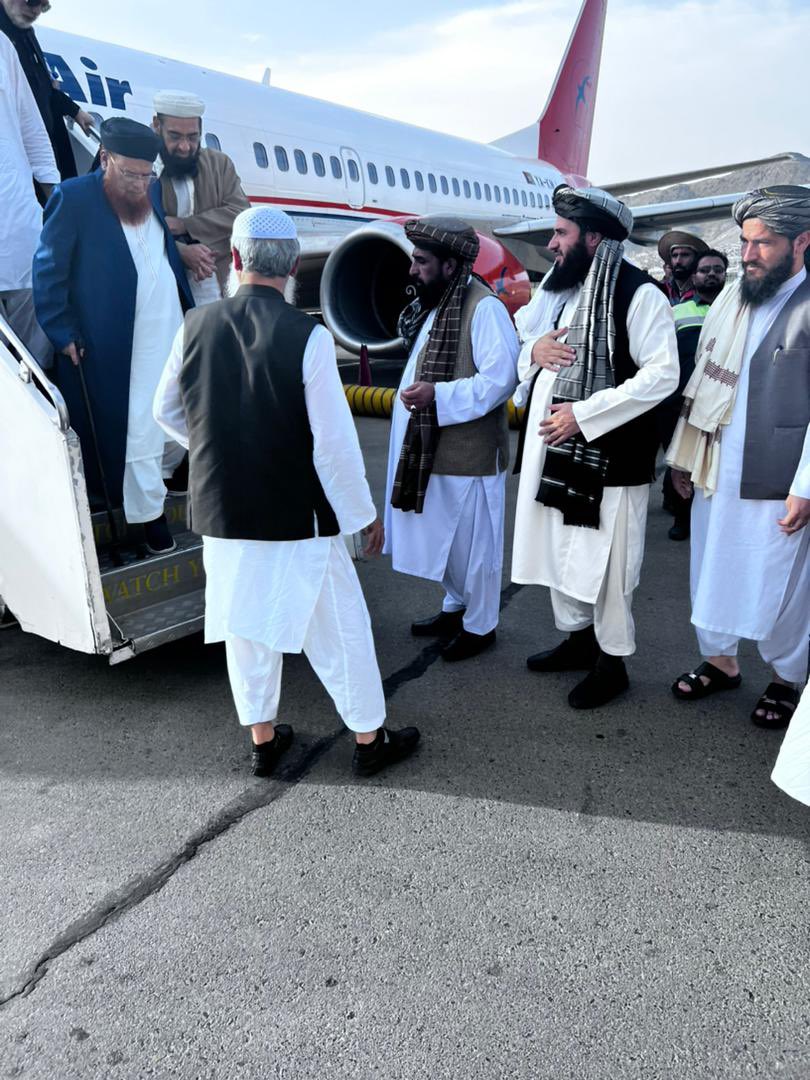PESHAWAR: A delegation of top Pakistani religious figures arrived in Kabul on Monday to discuss the Pakistan-Afghanistan bilateral ties and push forward the ongoing peace process between Islamabad and the outlawed Tehreek-e-Taliban Pakistan (TTP), said an Afghan official.
The TTP, or the Pakistani Taliban, has carried out some of the bloodiest attacks inside Pakistan since 2007, including a 2014 assault on a military-run school in Peshawar in which 134 students were killed. The group is not directly affiliated with the Afghan Taliban, but has pledged allegiance to them.
Pakistan has carried out a number of military offensives against the TTP, but it has not been able to fully stop the attacks, which had begun to rise again along its western border earlier this year. On June 4, the TTP extended its ceasefire with the government for an indefinite period, after two-day talks with a delegation of Pakistani tribal elders facilitated by the Afghan Taliban.
"Yes, members of the Pakistani delegation are likely to hold meet TTP members,” Waliullah Shaheen, head of the Center for Strategic Studies at the Ministry of Foreign Affairs in Afghanistan, confirmed while speaking to Arab News. “The Afghan government will thoroughly facilitate both sides to reach a peace deal."
Mufti Taqi Usmani, president of the Wifaqul Madaris Al-Arabia, is leading the Pakistani delegation, which also includes Mufti Hanif Jalandhari, Maulana Muhammad Tayyib Tahiri, Mufti Ghulam Ur Rehman and Maulana Anwarul Haq.

Mufti Taqi Usmani (first left), president of the Wifaqul Madaris Al-Arabia, arrives in Kabul, Afghanistan on July 25, 2022. (@Mufti_Muhammad_/Twitter)
Shaheen continued the visit of Pakistani religious scholars would help tackle bilateral issues, adding Kabul always looked forward such exchanges.
“As we’ve Islamic Emirate of Afghanistan government here, I think visits by religious leaders from Pakistan will be more effective in terms of solutions to issues. The Afghan government wants to effectively play a role to bring TTP and the Pakistani peace negotiators closer to reach a solution to their problems,” Shaheen said.
"The region has experienced unprecedented mayhem. We now want peace in the entire region. Even we want peace and tranquility between Pakistan and India."
He, however, said Islamabad should ease protocols at the Pakistan-Afghanistan border as a majority of Afghan patients visited Pakistan for treatment but they were facing problems at the border crossings.
“I think it will benefit both countries if Pakistan eases movement at the border points. For example, Afghan patients visit Pakistan in connection with medical treatment, which is a source of revenue for Pakistan’s medical sector,” Shaheen said. "But harassment of Afghan visitors at borders will only create hatred and acrimony."
On Monday, Muhammad Israr Madani, president of International Research Council for Religious Affairs, also told Arab News the Pakistani delegation would discuss TTP-related issues with the Afghan Taliban and other pressing matters affecting Kabul-Islamabad ties.
“I hope the visit will yield a positive outcome and convince the TTP's mid- and lower-level leadership to help navigate the ongoing peace talks to a logical end,” said Madani, whose organization works to mitigate intra-religious and social conflicts in Pakistan and Afghanistan.
Pakistan’s Foreign Office spokesman Asim Iftikhar Ahmad said the visit was part of the ongoing peace process between Islamabad and Kabul.
“Ulema’s exchanges take place on a regular basis for interaction with Afghan Ulema and sections of society,” Ahmad told Arab News. "This delegation is part of these exchanges."
The delegation is also expected to discuss technical aspects of FATA-KP merger with the TTP, which would level ground for result-oriented talks during the next round of negotiations.
The TTP has asked Pakistan to scrap a 2018 law that did away with the semi-independent status of the former tribal regions that dates back to British colonial rule. The law aimed to grant equal rights to millions of residents in the restive FATA areas once they were incorporated into Pakistan's authority as Khyber Pakhtunkhwa province.
The group also wants Pakistani troops to pull out of Khyber Pakhtunkhwa, release all the TTP fighters in government custody and revoke all the legal cases against them.
Saleh Shah, a former senator from Pakistan's South Waziristan district who is part of another delegation holding talks with the TTP, said the religious scholars, led by Mufti Usmani, would help "soften" up the TTP and pave the way for the next round of talks.
“A high-powered Pakistani delegation will depart for Kabul on July 29 for a meaningful round of talks with the TTP,” Shah said. "And I believe this delegation’s visit under Usmani will level ground for upcoming talks to bear tangible results."












